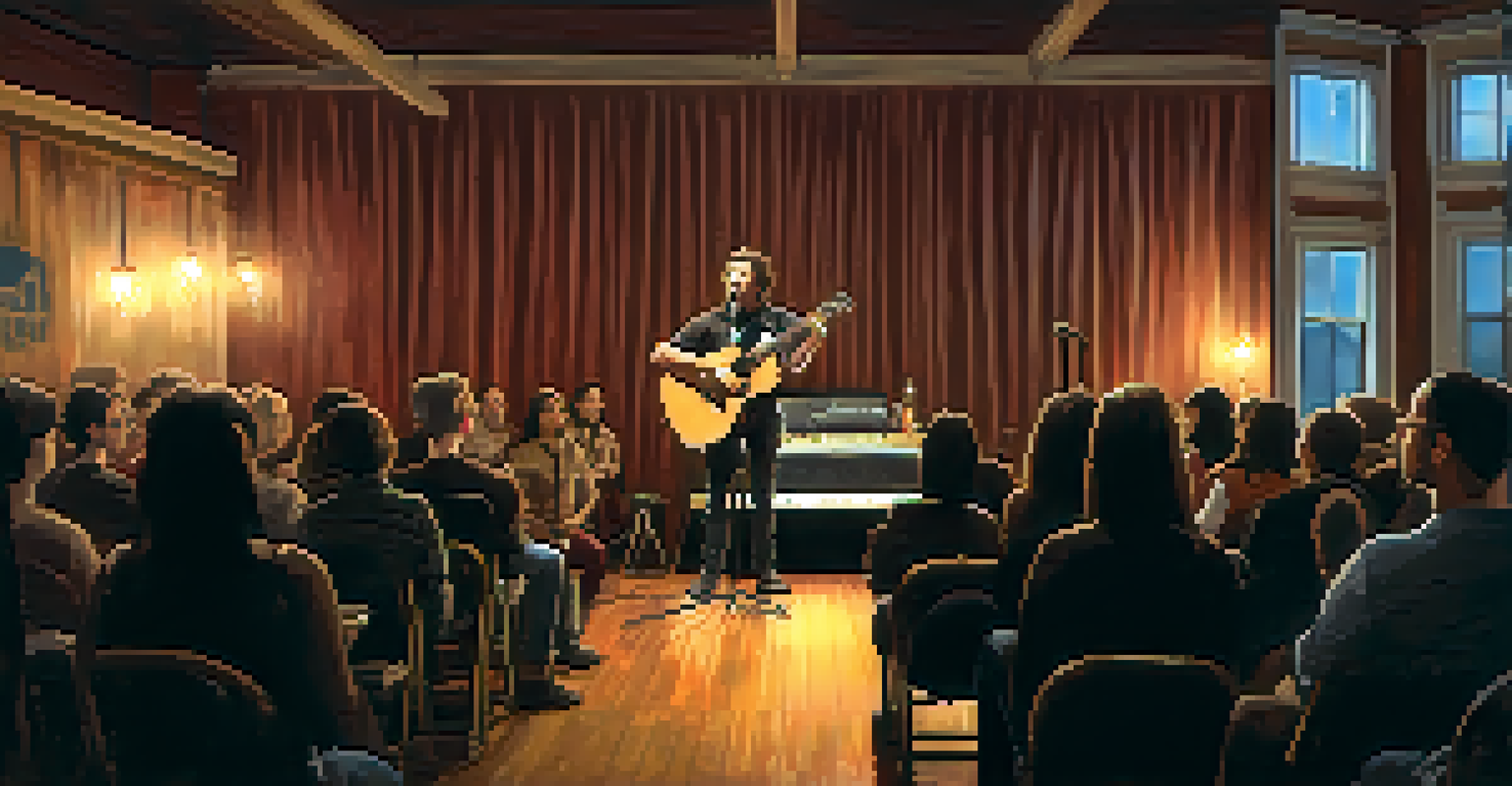The Psychology Behind Performance Anxiety in Music Performers

Defining Performance Anxiety in Musicians
Performance anxiety, often called stage fright, is a common experience for musicians. It refers to the feelings of nervousness, fear, or apprehension that arise before or during a performance. This anxiety can manifest physically with symptoms like sweating, trembling, or a racing heart. Understanding this condition is crucial, as it affects the musician's ability to perform and connect with their audience.
The more you practice, the better you get, but the more you perform, the more you realize that performance is about sharing, not perfection.
Many musicians experience this anxiety at some point in their careers, regardless of their skill level. Even seasoned performers can feel the pressure to meet expectations, both their own and those of their audience. This pressure can lead to a cycle of anxiety that impacts their overall performance and enjoyment of music. It’s essential to acknowledge that such feelings are normal and shared by many in the field.
By understanding performance anxiety, musicians can start to develop coping strategies. These may include techniques like visualization, breathing exercises, and preparation routines that help mitigate anxiety levels. Recognizing that anxiety is a common challenge can empower musicians to address it head-on, leading to more confident performances.
The Psychological Factors Contributing to Anxiety
Several psychological factors contribute to performance anxiety in musicians. One significant factor is the fear of negative evaluation, which is the worry that others will judge their performance harshly. This fear can stem from past experiences or high personal standards, creating a pressure cooker effect that heightens anxiety levels.

Perfectionism is another psychological trait often seen in musicians. While striving for excellence can motivate improvement, it can also lead to an overwhelming fear of making mistakes. When a musician is focused on achieving perfection, the prospect of imperfection can become paralyzing, making it difficult to perform freely and expressively.
Understanding Performance Anxiety
Performance anxiety, a common experience among musicians, can negatively affect their ability to perform and connect with audiences.
Additionally, self-doubt can play a crucial role in performance anxiety. Musicians may question their abilities or compare themselves unfavorably to others, leading to a lack of confidence. This self-doubt can create a vicious cycle where anxiety feeds into a performer’s belief that they are not good enough, further exacerbating the issue.
The Impact of Performance Anxiety on Musicians
Performance anxiety can have a significant impact on musicians, affecting not just their performances but also their mental health. The immediate effects can include poor concentration, memory lapses, and even physical symptoms like nausea. These effects can hinder a musician's ability to showcase their talent and connect with the audience.
It's not the event that creates the anxiety, but the meaning we attach to it.
In the long term, chronic performance anxiety can lead to burnout or a desire to withdraw from performing altogether. Many musicians may choose to avoid situations that trigger their anxiety, which can limit their growth and opportunities in their careers. This avoidance can create a sense of isolation from the music community and lead to a decline in their passion for music.
Moreover, the emotional toll of performance anxiety can lead to feelings of shame or inadequacy. Musicians may feel that their anxiety makes them less worthy as artists, which can further perpetuate the cycle of anxiety. Recognizing these impacts is essential for developing strategies to combat performance anxiety and foster a supportive environment.
Coping Strategies for Managing Anxiety
Numerous coping strategies can help musicians manage their performance anxiety. One effective technique is mindfulness, which involves focusing on the present moment without judgment. Mindfulness practices can help musicians ground themselves and reduce anxious thoughts, allowing them to perform more freely.
Another popular method is the use of visualization techniques. Musicians can visualize themselves performing successfully, which can help reframe their mindset and build confidence. This mental rehearsal can create a sense of familiarity and reduce the fear associated with performing in front of an audience.
Coping Strategies for Musicians
Techniques such as mindfulness, visualization, and pre-performance routines can effectively help musicians manage their performance anxiety.
Finally, developing a pre-performance routine can also alleviate anxiety. Routines can include warm-up exercises, breathing techniques, or even simple affirmations. By establishing a consistent routine, musicians can create a sense of control and preparedness, making the performance experience less daunting.
The Role of Support Systems in Alleviating Anxiety
Support systems play a crucial role in helping musicians cope with performance anxiety. Friends, family, and fellow musicians can provide encouragement and understanding, creating an environment where performers feel safe to express their fears. Sharing experiences with others can also normalize anxiety, reminding musicians that they are not alone in their struggles.
Mentorship can be particularly beneficial for emerging musicians dealing with performance anxiety. Experienced musicians can share their own stories and coping techniques, providing valuable insights and support. This guidance can help younger performers navigate their anxiety and build resilience over time.
Additionally, professional support from therapists or counselors can be invaluable. These professionals can offer tailored strategies and techniques to address anxiety on an individual basis. Seeking help is a strong step towards managing performance anxiety and can lead to healthier coping mechanisms.
The Influence of Audience Expectations
Audience expectations can significantly contribute to performance anxiety for musicians. The pressure to entertain and meet the audience's standards can create a sense of fear and self-consciousness. Musicians may worry about how their performance will be perceived, which can distract them from fully engaging with their music.
It's important to remember that audiences are often more forgiving than musicians anticipate. Many listeners appreciate the effort and passion behind a performance, regardless of minor mistakes. Understanding this can help shift a musician's focus away from perfection and towards the enjoyment of sharing music.
Support Systems Matter
Having a strong support system of friends, mentors, and professionals is crucial for musicians in coping with performance anxiety.
By reframing the perception of audience expectations, musicians can cultivate a more positive performance mindset. Emphasizing connection over perfection allows performers to engage authentically with their audience, reducing anxiety and enhancing the overall performance experience.
Long-Term Strategies for Overcoming Performance Anxiety
Overcoming performance anxiety is often a journey that requires long-term strategies and commitment. One effective approach is gradual exposure, where musicians gradually increase their performance opportunities in low-pressure settings. This can help desensitize them to anxiety triggers and build confidence over time.
Setting realistic goals is another key to long-term success. Musicians should aim for progress rather than perfection, celebrating small victories along the way. This shift in mindset can help alleviate the pressure that often accompanies performance and foster a healthier relationship with music.

Finally, ongoing self-reflection is essential for managing performance anxiety. Musicians should regularly evaluate their experiences and feelings surrounding performance, identifying patterns and triggers. This self-awareness can empower musicians to develop personalized coping strategies, ultimately leading to more fulfilling performances.